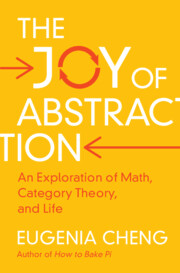Book contents
- Frontmatter
- Dedication
- Contents
- Prologue
- Part One Building up to Categories
- 1 Categories: the idea
- 2 Abstraction
- 3 Patterns
- 4 Context
- 5 Relationships
- 6 Formalism
- 7 Equivalence relations
- 8 Categories: the definition
- Interlude A Tour of Math
- Part Two Doing Category Theory
- Epilogue Thinking categorically
- Appendices
- Glossary
- Further Reading
- Acknowledgements
- Index
2 - Abstraction
from Part One - Building up to Categories
Published online by Cambridge University Press: 13 October 2022
- Frontmatter
- Dedication
- Contents
- Prologue
- Part One Building up to Categories
- 1 Categories: the idea
- 2 Abstraction
- 3 Patterns
- 4 Context
- 5 Relationships
- 6 Formalism
- 7 Equivalence relations
- 8 Categories: the definition
- Interlude A Tour of Math
- Part Two Doing Category Theory
- Epilogue Thinking categorically
- Appendices
- Glossary
- Further Reading
- Acknowledgements
- Index
Summary
An overview of the abstract side of mathematics, to put us in a good state of mind for category theory. It’s important not to be thinking of math in the common narrow way as numbers, equations, and problem-solving. This chapter will still have little formality. We will discuss the fact that abstraction is important because it takes us to a context in which logic works precisely. Math uses logic and abstraction together, which is how arguments are made very rigorous. We will describe the trade-off, which is that we gain rigor but lose details. However, we will also describe how this in turn gains us wider applicability. Other disadvantages include the fact that it can seem hard and remote from real life, but the difficulty in turn means we are stretching our brains, and the remoteness means we can unify a broader range of examples. We will also describe how math turns abstractions into new concepts and studies them carefully, and how abstraction often increases as we progress through math education, but that doesn’t necessarily mean that abstract math is harder. We will also crucially discuss the fact that abstraction can be fun.
- Type
- Chapter
- Information
- The Joy of AbstractionAn Exploration of Math, Category Theory, and Life, pp. 23 - 34Publisher: Cambridge University PressPrint publication year: 2022



